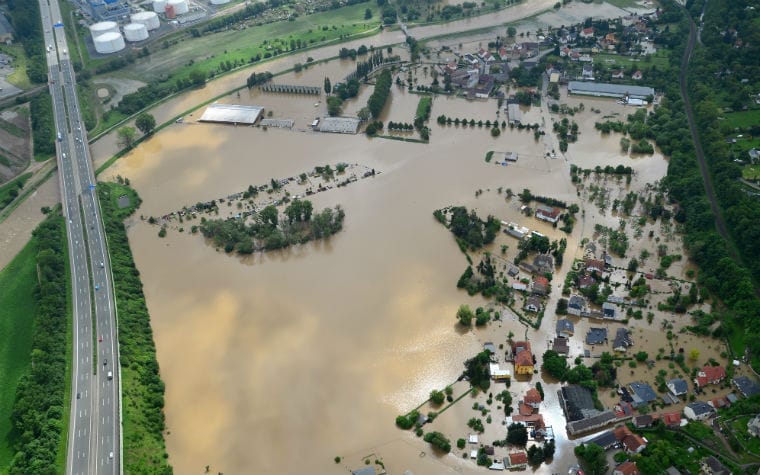Workplace Culture
Hurricane Harvey Shows the Need for Employer Communication and Empathy
By Ariel Parrella-Aureli
Aug. 31, 2017
Although he’d rather not be reminded of the blizzard that dumped 21 inches of snow on Chicago over two days in 2011, Adam Ochstein also shivers when he recalls the record-breaking chill when the city was hit by the polar vortex during the winter of 2014.
The CEO of StratEx, a Chicago-based HR service company, admits his business was ill-prepared for the natural disasters. Local business partners could empathize with inevitable disruptions, but since StratEx’s clients span the country, he remembers most did not care about the weather’s effect on business; they just wanted their services.
Ochstein, who has been the CEO for 16 years, is aware of the challenges faced by businesses now in southeast Texas and Louisiana given the devastation wrought by Hurricane Harvey. Spotty power and sporadic communication tools only add to the uncertainty in contacting employees regarding vital information.
During stressful times, companies need to be aware of ways to best communicate with their employees if technology is disrupted by natural disasters. They also need to have safety measures in place and make their workers feel comfortable while keeping the organization working.
Ochstein said boosting morale and showing empathy for employees is crucial in times of tragedy. StratEx paid for Ubers or taxis and catered lunch to make sure employees felt comfortable still coming to work as the blizzard set in. Once the snowstorm paralyzed Chicago, StratEx leaders realized the best way to continue was allowing employees to work remotely.
“[We used] any means necessary to communicate family first, business second,” Ochstein said.
Pam Goncalves, chief of staff for GuideSpark, an employee-communications software company, said communicating with employees through corporate social media channels and platforms and even simple phone trees keeps employees in the loop following a natural disaster like Harvey.
“Most HR teams, including GuideSpark’s, will then start dialing cell phones, land lines and emergency contacts until they have reached every last employee,” Goncalves said.
She noted that employees often need to relay critical corporate information to customers and business partners, so having crisis communication solutions in place is the next step that companies should have in place.
Those in leadership positions have a responsibility to their staff to communicate effectively in times of turmoil, and Goncalves said receiving a message from the CEO or the head of HR can alleviate worry and show support and empathy.
For example, if an employer has to temporarily close, encouraging employees to volunteer at local shelters can make them feel less helpless, she said.
“One theme in the overall communication is to remember extended family and friends,” Goncalves added. “Even though a company may not have been directly impacted by the disaster, that doesn’t mean its employees don’t have family or friends affected by the crisis.”
For Mishell Parreno Taylor, an employment attorney in the San Diego office of Littler Mendelson, the tragic times in Harvey hit home; she grew up in Houston and attended college there, and her family and friends still live in the area.
Parreno Taylor, along with her colleagues, published an insight piece on Littler’s website Aug. 29 about the legal responsibilities employers have after a hurricane. She told Workforce that everyone has to come together during times of crisis. Constant communication is essential, but if social media channels and phones are down, employers need to have emergency contact information and identify critical groups and services locally so there is a backup communication plan.
If workplaces are destroyed or deemed unsafe, companies may offer employees remote work options. Goncalves remembers employees having to work remotely in 1989 after the Loma Prieta earthquake devastated the San Francisco Bay Area at a time when communications tools were primitive compared to today’s standards. Parreno Taylor said employers and employees must be clear about wage and hours when working remotely, while remembering that everyone is doing the best they can.
“If you have people out there putting in time and working remotely there is an obligation to compensate them for that time,” she said. “It’s important, though, from wage-hour claims that an employer communicates time and attendance policies that shows compensable time and is accurately reporting time.”
Parreno Taylor stressed the importance of supporting each in the weeks and months following Harvey’s destruction. She translated her insight column into Spanish for the diverse population in southeast Texas. She shared that company leaders need to listen to employees and “make sure to balance the needs and morale of your workforce with continuing the workforce.”
Continuing the workforce is easier now for Ochstein, who said StratEx has over 100 employees around the country and would be better equipped collaboratively and with safety if another natural disaster were to occur.
“We have a drill in place for how we handle some type of business discontinuance or natural disaster; we have all the communication and collaboration tools,” he said.
Ariel Parrella-Aureli is a Workforce intern. Comment below or email editors@workforce.com.
Schedule, engage, and pay your staff in one system with Workforce.com.
